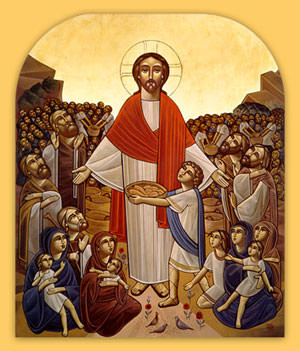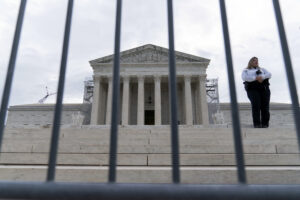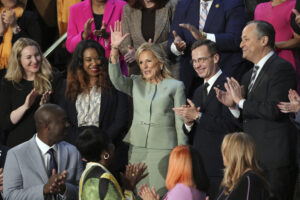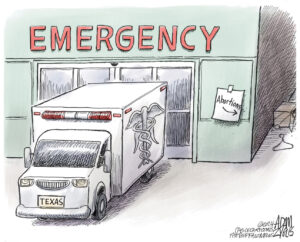Catholic Bishops Put Sex Obsession Ahead of the Sick and the Poor
First they threatened to take down health care reform over abortion coverage Now they're threatening services to the sick and poor of Washington, DC, over same-sex marriageFirst they threaten health care, now the sick and poor of Washington, D.
By Adele M. Stan, AlterNetEditor’s Note: This story was originally posted on AlterNet.
They lead a church that claims to stand on the side of the sick and the poor, the meek who shall inherit the earth. But in the course of a single week, the bishops of the Roman Catholic Church proclaimed themselves willing to see health-care denied to millions of uninsured Americans, and to yank the social-service rug out from under the feet of tens of thousands of urban poor in the nation’s capital — all to serve the bishops’ obsession with the sex lives and reproductive organs of others.
The church’s week of shame began with the bishops’ role in creating the monster that is the Stupak amendment to the health-care reform bill passed last weekend by the House of Representatives, when the bishops refused to bless a compromise made between pro-choice and anti-abortion Democrats in the language of the bill. (Without the bishops’ blessing, anti-choice Democrats vowed to vote against the bill, so Speaker Nancy Pelosi was strong-armed into allowing Rep. Bart Stupak, D-Mich., to bring an anti-choice amendment to the floor.) Finishing off the week with a brutal bang, the church threatened to sever its social service contracts with the District of Columbia if the city council of Washington, D.C., passes a measure legalizing same-sex marriage — a move that would throw services to 68,000 of the poorest and most vulnerable citizens of the nation’s capital into chaos.
This week in the life of the church, says Frances Kissling, the long-time Catholic feminist activist and current visiting scholar at the University of Pennsylvania Center for Bioethics, demonstrated the church’s “willingness to just be a bully.” (Full disclosure: I worked for Kissling in 1998, during her 30-year tenure at the helm of Catholics for Choice.)
The Poor Must Suffer for the Sin of Same-Sex Marriage
Edward Orzechowski is the president and chief executive officer of Catholic Charities of the Archdiocese of Washington. At issue for the church, he said in a press statement, is that the committee drafting the measure in the city council had adjusted the language so that the church would be forbidden from discriminating against same-sex couples in either the adoptions it arranges for the city’s foster-care system, or in the employment benefits it offers to its own personnel.
Many of the people who work for Catholic Charities, Orzechowski told the Washington Post, hail from the LGBT community, so the church would be forced to violate its tenets if the anti-discrimination provision remained in the marriage-equality measure. Just so you have that straight: gay, lesbian, bisexual and transgender people are good enough to work for Catholic Charities, as long as it’s okay for the church offer them a lower level of benefits than those conferred on heterosexual couples. And what of the thousands of good people who work hard jobs for low pay in the employ of Catholic Charities in Washington? What will become of their jobs if the church severs its contracts with the city?
“It’s a dangerous thing when the Catholic Church starts writing and determining the legislation and the laws of the District of Columbia,” said city council member Tommy Wells (D-Ward 6), chairman of the Human Services Committee, told the Post, only to receive this rejoinder:
Susan Gibbs, a spokeswoman for the archdiocese, countered that the city is “the one giving the ultimatum.”
“We are not threatening to walk out of the city,” Gibbs said. “The city is the one saying, ‘If you want to continue partnering with the city, then you cannot follow your faith teachings.’ “
“This is the way the church has dealt with every human being from time immemorial — and that is to somehow make everybody else feel guilty, and they’re never guilty,” said Kissling, the former president of Catholics for Choice, in an interview with AlterNet. “It’s true in your personal life, it’s true about if you have an abortion, or if you’re gay, or if you want to get divorced. It’s always, somehow, you who is being selfish.”
Bishops on Steroids
To many observers, the church’s strong-arming of both House Democrats and the Democrats of the District of Columbia city council arrived as a sudden and unexpected show of force. Except for the election-year antics of individual bishops bent on denying the church’s sacraments to pro-choice Catholic politicians, the institutional church has assumed a more reserved political posture in recent years. That may be, in part, that eight years of the Bush administration gave them less to oppose at the federal level in the way of abortion rights. But the big obstacle to the flexing of the magisterial muscle in the political arena was the church’s willingness to hide the sexual crimes of its priests — crimes perpetrated against children, first exposed by the Boston Globe in 2002.
“And the sex abuse thing was on everybody’s mind, and every time they tried to flex their muscles, somebody would bring up the sex abuse,” Kissling explained. “So they didn’t get as much of an opportunity to flex their muscles because their moral authority had been totally eroded. Nobody remembers anything for very long, you know? And now it’s like, eight years, or whatever it’s been since the sex-abuse thing, and so nobody’s talking about that any more. And so now they can flex their muscles again.”
By its own account, the United States Conference of Catholic Bishops reports that it has paid a total of $2.6 billion to settle sexual-abuse claims made against its priests. Since the Globe broke the story of the bishops’ practice of concealing the crimes of abusive priests while moving them from parish to parish, where they claimed additional victims, seven dioceses have filed for bankruptcy because of the abuse claims.
Just last month, the Diocese of Wilmington, Delaware, filed for federal bankruptcy protection on the eve of a civil trial about the church’s role in the abuse scandal, after settlement negotiations with victims of priestly sex-abuse broke down. Bankruptcy protection could permit the diocese to keep secret for years to come what its leaders knew about the abuse, David Clohessy of Survivors Network of those Abused by Priests told Bloomberg News, if long delays in the resolution of plaintiffs’ lawsuits result from bankruptcy protection. “The crisis has always been about secrecy for church officials, from day one,” he said. The bankruptcy filing put a hold on all 131 sex-abuse cases against the diocese.
Sex and Secrets in the Church
There is no small irony in the church’s self-appointed role as the moral arbiter of human sexuality, whether in the areas of human reproduction or non-heterosexual sex. As an institution, it ranks among the world’s most sexually dysfunctional. Its demands for life-long celibacy from its priests and nuns attract no small number of people who are uncomfortable with their own sexuality — be it something as benign and normal as homosexuality, or something criminal and predatory, as in the case of the priests who preyed on minors. Despite the high number of gay men in the priesthood — most of them likely celibate — speaking of their orientation publicly, while not expressly proscribed, is not exactly encouraged. The church addresses the sexuality of its own leaders by drawing a curtain around it, creating a culture of sexual secrecy that can only lead to dysfunction. By its actions, the church seems to say it’s not the sex that’s the sin, but evidence thereof. And that makes heterosexual sex primarily a woman’s sin, evidenced by pregnancy, a dynamic that feeds the misogyny of the church’s all-male leadership.
Many will argue that the church’s anti-abortion position is not about sex; it’s about the fetus, they will say. Yet if you take the church’s fierce opposition to abortion — without mercy even in cases of rape or incest — in the context of its opposition to contraception, it becomes difficult to accept the notion that the church’s dysfunction on matters of sexuality doesn’t enter into the equation.
The church has long excluded women from the priesthood for no reason other than their sex. Only a very naive or stupid woman would take church leaders at their word when they stake their abortion position on their purported love for the fetus. How many pregnant women will the Archdiocese of Washington abandon in favor maintaining a discriminatory practice against those LGBT people willing to speak the name of a love once denied them. How many babies born to mothers unable to care for them would the church prefer to see languish in foster care rather than place them in the home of a same-sex couple capable of raising them? Does love for the fetus end at the outer bank of the birth canal?
Getting Their Way?
At press time, leading members the city council of the District of Columbia seemed unwilling to yield to the church’s demands. If the church walks away from its contractual obligations to society’s less fortunate, it won’t be the first time it has done so. In Boston, where the sex-abuse scandal first came to light, Catholic Charities ended its adoption programs in 2006 when Massachusetts banned discrimination against same-sex couples. In 1991, the City of New York reached a compromise with the Archdiocese of New York after a threat to give back to the city thousands of teen-age children in foster care after the state passed a law mandating access to contraceptives for children over the age of 12.
But in the Congress, things are different. There a stand against the newly invigorated church can mean major policy losses, thanks to the efforts of conservative Democrats like Stupak, recruited by the Democratic National Committee to run in less-than-liberal districts, who are allied with the bishops on matters concerning women’s rights.
“So the bishops were able to get their way,” Kissling says of the anti-abortion measure added to the health-care bill. “And the thing with the bishops is, if they can get their way, no nuance or doubt enters their minds about whether getting their way is the right thing to do.”
NOTE: The Catholic Alliance for the Common Good, a group that supports the anti-abortion Stupak amendment, was invited to comment for this article. AlterNet’s call was not returned.
Your support matters…Independent journalism is under threat and overshadowed by heavily funded mainstream media.
You can help level the playing field. Become a member.
Your tax-deductible contribution keeps us digging beneath the headlines to give you thought-provoking, investigative reporting and analysis that unearths what's really happening- without compromise.
Give today to support our courageous, independent journalists.






You need to be a supporter to comment.
There are currently no responses to this article.
Be the first to respond.